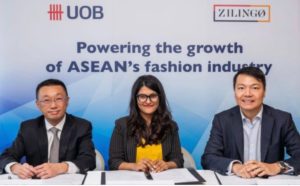ANTONIA HORLICK WRITES — Zilingo is a Singapore-based e-commerce beauty and lifestyle marketplace that enables merchants from Southeast Asia without an online presence to sell products directly to consumers. The private company was founded in 2015 by Ankiti Bose and Dhruv Kapoor, who saw a unique opportunity to help small merchants sell their products globally.
The business includes two forms of marketplace: Business-Business (B2B) and Business-Consumer (B2C). The two forms are different in unique ways. B2C allows customers to select products based not only on price but on popularity, status and branding, whereas B2B customers make their decisions on price and profit potential.
Through the B2B platform, Zilingo has enabled small and big businesses to optimize the fashion supply chain and to grow their services. Zilingo users can upload and manage their own inventory in any language, using any currency. By interfacing with 25 different set-ups in terms of logistics, warehousing and payment, as well as other financial services like loans arranged directly with banks, it is an extremely efficient and effective platform.
Co-founder Ankiti Bose says, “ nowhere in the world has a horizontal e-commerce company also cracked fashion…  It’s a unique, high-margin category that is highly dependent on fast moving cycles and has its own nuances. Unlike buying detergent or electronics, fashion is much more about your choice, individuality and trends. It requires a different approach than the rest of e-commerce.”
It’s a unique, high-margin category that is highly dependent on fast moving cycles and has its own nuances. Unlike buying detergent or electronics, fashion is much more about your choice, individuality and trends. It requires a different approach than the rest of e-commerce.”
Zilingo has found a unique opportunity in the US-China trade war. Consider this: Trump’s tariff increases affect over $200 billion of Chinese imports to the United States (from 10% to 25%) Although the apparel industry was not included in the raised tariffs, many fashion businesses are worried that they will soon be. According to the South China Morning Post, China still remains the United States’ primary source of apparel imports but its market share has been falling steadily since the tariffs. Zilingo, unlike a lot of other companies, has benefitted.
As a result of the tariffs, a number of US-based apparel companies have moved production outside of China and have decided to source directly from Southeast Asian factories. This strategy allows these US firms to ship goods without the higher tariff burden. Tech In Asia notes that Zilingo has benefitted, in this way, more than 4,000 factories in the Southeast Asia region.
Here’s how it works: Whenever a deal is brokered or a sale is made via the Zilingo platform, the company takes a cut. To date, Zilingo generates around 80% of its revenue from its B2B operation of matching brands with suppliers in Southeast Asia, Bangladesh, and India. Not only is the business profitable, it is more efficient by eliminating a lot of the agents that brands and factories used to have to deal with, which in turn ensures that profits can be more evenly spread across the fashion industry. In addition, Bose claims that this technology is attractive to South Asian and Southeast Asian factories that are still catching up with technological advancements.
Put another way—by eliminating many of the middlemen, and women, so often used in the fashion industry, Zilingo may have cracked the international fashion code and created a whole new type of e-commerce outfit (no pun intended).


